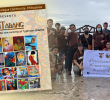by JEREMAIAH M. OPINIANO
www.ofwjournalism.net
QUEZON CITY – A FINGER-LENGTH shard of metal on a white tissue paper nearly made Ailyn Mateo�s mother faint.
Taken from Mateo�s right shoulder, the shrapnel from a bomb that killed 22 armed combatants and 11 civilians is a terrible testament to Filipinos� desperation for work, even in a hell hole called Iraq.
Mateo, a mother of two, is one of the migrant workers whose survival from an episode in the four-year war was snapped on celluloid in a film documentary by Chinese American Lee Wang.
Shown recently here among members of nonprofit groups and government officials, the 24-minute video documentary revealed the uncanny ability of Mateo and over-6,000 Filipinos like her to earn a living deep within violence-riddled Iraq.
Likewise, it also showed an elaborate trail of hiring �third-country nationals� or TCNs �as these migrant laborers from the Philippines, India, Sri Lanka, and Nepal are called� through recruiters in Kuwait and the United Arab Emirates.
The film titled �Someone Else�s War� showed these workers remain available despite a government ban for Filipinos to go to Iraq now on its third year.
Hence, Wang, his producers, and migrants� rights advocates here consider the continued recruitment of Filipino hired help for American military bases in Baghdad a form of trafficking�and the accountability trail for whatever happens to these workers leads to US companies.
�In the background of this war is an unseen army�neither American nor Iraqi. They are all here in the middle of someone else�s war,�� said Wang in a voice-over on her documentary.
Blasted
THAT war Mateo came close to know as a food service worker in a US military facility in Baghdad.
In a reconstruction of the night some time May 2006, the film showed Mateo, a white bandana hiding her forehead, putting food on trays of uniform-clad men queued in front of a stainless steel counter.
Then a missile exploded, sending food, debris, and human body parts flying across the swath of a light brown desert.
According to Mateo�s mother Fe, an American soldier grabbed her arm and led her to safety amid the chaos.
When he heard the words �I am okay,� Mateo said the soldier left purportedly to see if more could be saved.
When Mateo came home a month later, all she could remember of that night comes from the shrapnel that hit her shoulder.
She thought TCNs like her were invisible to the soldiers whose facilities they clean and whose trucks carrying weaponry they drive across the Iraqi border.
Apparently, how Mateo got there almost remained invisible had the trail of recruitment wasn�t uncovered by the documentary, according to Lucille Quiambao, Wang�s field producer.
OFWS & Migration, Pinoy Life Abroad









